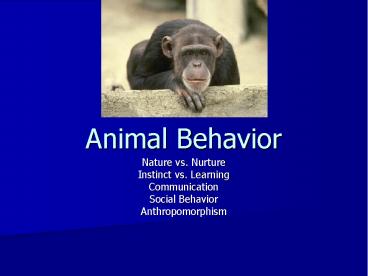Animal Behavior - PowerPoint PPT Presentation
Title: Animal Behavior
1
Animal Behavior
- Nature vs. Nurture
- Instinct vs. Learning
- Communication
- Social Behavior
- Anthropomorphism
2
5 Types of Behavior
- Foraging How do they find food?
- Social How do they interact with other animals
both interspecific and intraspecific - Interspecific interactions with OTHER species
- Intraspecific interaction within their same
species - Territorial How do they define and defend their
spot? - Cyclic Do they have a routine that cycles
throughout the year, month, season, etc.? - Communication How do they communicate with
other organisms again both interspecific and
intraspecific
3
Instinct vs. Learning
- Instinct reflexes, reactions, knowledge an
animal is born with - Ex.- hunger, fear, motion, imprinting
- Learning must be taught, not born with it
- Ex.- speech, riding a bike, reading
4
Types of Learning
- Habituation animals become less and less
concerned about or affected by something the more
they experience it they become desensitized - Classical Conditioning animals learn to
associate one thing with another. Ex Pavlovs
dogs - Operant Conditioning an animal learns through
the experience of trial and error, and positive
or negative reinforcement - Insight Learning animals take
knowledge/previously learned skills and put them
together to solve a new and unique problem
5
How Do Animals Communicate?
- Visually bright colors, expressions, actions,
body language, etc. - Vocally different sounds mean different things.
Ex.- a good mother can tell the difference
between an Im hungry cry and a change me cry - Touch grooming habits, showing love, fighting
- Chemically usually through pheromones or other
scents, ex- a dog peeing on something to mark his
territory
6
How Do Humans Communicate?
- We have all the communication abilities of any
other animal, PLUS we have language. - Does this mean that animals cant speak and/or
cant understand language? (Discuss)
7
Social Behavior
- Benefits
- provides protection against predators
- helps to raise the young
- increased food
- division of labor
- altruism
- Disadvantages
- Competition
- spread of disease
- stress due to the maintenance of the social
structure (territorial and dominance behavior)
8
Anthropomorphism
- Definition assuming that animals have the same
thoughts, emotions, motives, and feelings that we
do - For example, do animals think like us? Do they
feel pain like we do? Can they be happy and sad?
Are they aware of their place in the world? - What do you think?
9
Nature VS. Nurture
- CR-1 NATURE VS. NURTURE (16 points)
- Directions
- Use the information below to answer Number 1.
- The idea that behavior must either be innate or
learned is called the nature vs. nurture
controversy. However, many animal behaviorists
believe that a strict dichotomy between the two
does not exist. - Differentiate between innate and learned
behaviors. In your response, be sure to - Define both types of behaviors.
- Identify two reasons for believing that such a
strict dichotomy does not exist. - Explain the evolutionary advantages for animals
to exhibit both types of behaviors. - Use appropriate scientific vocabulary and
specific details when writing your answers.
10
BCR Response
- There has long been a controversy surrounding the
idea that either nature or nurture controls
animal behavior however, many animal
behaviorists believe that a strict dichotomy
between the two does not exist. Innate behavior
is behavior that is inherited or preprogrammed.
These behavior patterns are believed to develop
in the same way regardless of environment they
are instinctive. The other aspect of behavior is
learning, which is a modification of behavior
through experience. - Many behavioral scientists believe that behaviors
cannot develop without experience and that all
forms of behavior depend on an interaction of the
organism and environment. Other behavior
scientists believe that many complex sequences of
behavior are not learned and appear to be
programmed. This nature vs. nurture debate is
exemplified in the male white-crowned sparrow,
which must learn the song of its species by
hearing the song of its father. If it is hand
reared it will develop an abnormal song. If it
hears recordings of other white-crowned sparrows
within the first couple months after hatching, it
will learn to sing normally. However, if it hears
recordings of another species of sparrow, it does
not learn the song. It innately knows that this
is not its species and therefore cannot learn the
song. It is programmed to only learn songs from
the male of its species. If it were to learn the
song of another species, there would be behavior
chaos, females of the other species would be
attracted to the white-crowned sparrow they
would be unable to mate. There are evolutionary
advantages for animals to exhibit both kinds of
behaviors. Natural selection favors both innate
and learned behaviors to eliminate these kinds of
errors and thus allow species to survive and
reproduce.































